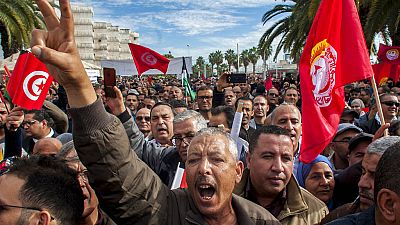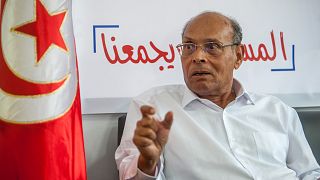Tunisia
Flights were cancelled, public transport grounded, and government offices were closed in a nationwide strike by Tunisia's public sector on Thursday.
The strike is aimed at mounting pressure on a president already facing a string of deteriorating economic crises.
Tunisia's powerful General Labour Union (UGTT) announced the walkout, which was expected to include 159 state enterprises, on the basis of pressing social and economic demands. The union is demanding wage increases and protesting the government's planned economic reforms.
The purchasing power of Tunisian citizens has eroded since the beginning of the year amid rising prices, high unemployment and widespread poverty.
President Kais Saied announced plans to cut its massive public wage bill last week, adding that it would progressively reduce energy and food subsidies starting next year. The government said it would replace subsidies with cash handouts for low-income families.
In July 2021, Saied abruptly dismissed the government and took on sweeping powers. While his critics accuse him of staging a coup, Saied said he had acted in response to widespread economic and social discontent.
Many are concerned Thursday's strike could seriously impact an already fragile economy and fuel an already tense political situation. An increasingly isolated Saied has run the country alone for 10 months, ruling by decree, while key Western allies have raised concerns of democratic backsliding.
A meeting between the government and the UGTT was held Tuesday but failed to yield an agreement.
union president, Noureddine Tabboubi had told the Ap over the weekend that Thursday's strike was a necessary response to Tunisia's high inflation rate– which according to the Institute of Statistics, reached 7.8% in May – and to high living costs that intensified with the Central Banks' recent decision to increase interest rates.
The union chief said the strike had the potential to set off a "social explosion" that was "normal and inevitable."
A key issue for Saied's government is the country's urgent need to secure a new loan from the International Monetary Fund (IMF), Tunisia's fourth loan in a decade.
Ahead of negotiations that have been stalled for months, the IMF demanded that Tunisia institute economic reforms, including the reduction of the subsidies that many impoverished Tunisians depend on.
IMF spokesperson Gerry Rice welcomed Tunisia's proposed economic reforms and said discussions with authorities were advancing.
But union leader Tabboubi accused the government of wanting to "sell the country and impoverish the population" by imposing changes dictated by the IMF.
The union leader has debunked claims that the strike is a political action.












00:50
Ons Jabeur retires from Wimbledon Opener due to breathing issues
02:03
Libya hosts African volleyball championship
Go to video
Tunisia: new Human Rights Watch report finds dramatic increase in politically motivated arrests
Go to video
The EU moves to fast-track asylum claims by migrants from 7 countries to speed deportation
Go to video
Libya devalues currency for first time in four years amid fiscal strain
01:59
Tunisians observing Ramadan turn to snails as meat prices soar